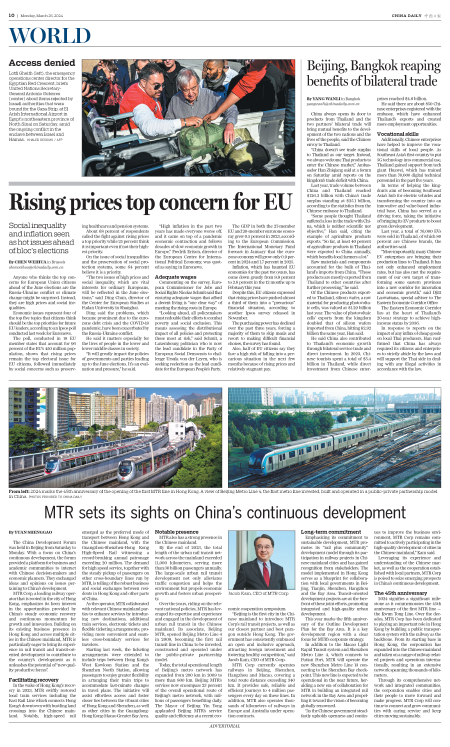China always opens its door to products from Thailand and the two partners' bilateral trade will bring mutual benefits to the development of the two nations and the lives of the people, said the Chinese envoy to Thailand.
"China doesn't see trade surplus to Thailand as our target. Instead, we always welcome Thai products to enter the Chinese market," Ambassador Han Zhiqiang said at a forum on Saturday amid reports on the kingdom's trade deficit with China.
Last year, trade volume between China and Thailand reached $126.3 billion with China's trade surplus standing at $25.1 billion, according to the statistics from the Chinese embassy to Thailand.
"Some people thought Thailand suffered a loss in the trade with China, which is neither scientific nor objective," Han said, citing the example of agriculture products exports. "So far, at least 40 percent of agriculture products in Thailand were exported to China annually, which benefits local farmers a lot."
Raw materials and components accounted for the bulk of Thailand's imports from China. "Those products are mostly exported from Thailand to other countries after further processing," he said.
Of the Chinese products exported to Thailand, silicon wafer, a raw material for producing photovoltaic cells, was valued at $1.29 billion last year. The value of photovoltaic cells' exports from the kingdom doubled that of silicon wafers imported from China, hitting $2.92 billion the same year, Han said.
He said China also contributed to Thailand's economic growth through bilateral service trade and direct investment. In 2023, Chinese tourists spent a total of $5.4 billion in Thailand, while direct investment from Chinese enterprises reached $4.6 billion.
He said there are about 850 Chinese enterprises registered with the embassy, which have enhanced Thailand's exports and created more employment opportunities.
Vocational skills
Additionally, Chinese enterprises have helped to improve the vocational skills of local people. As Southeast Asia's first country to put 5G technology into commercial use, Thailand gained support from tech giant Huawei, which has trained more than 70,000 digital technical personnel in the past five years.
In terms of helping the kingdom's aim of becoming Southeast Asia's hub for electric vehicles and transforming the country into an innovative and value-based industrial base, China has served as a driving force, taking the initiative of bringing its EV products to boost green development.
Last year, a total of 76,000 EVs were sold in Thailand, of which 80 percent are Chinese brands, the authorities said.
"More importantly, many Chinese EV enterprises are bringing their production lines to Thailand. It has not only enhanced employment rates, but has also met the requirement of our own target of transforming some eastern provinces into a new corridor for innovation and economic growth," said Djitt Laowattana, special adviser to The Eastern Economic Corridor Office.
The Eastern Economic Corridor lies at the heart of Thailand's 20-year strategy to achieve high-income status by 2036.
In response to reports on the impact of any influx of cheap goods on local Thai producers, Han reaffirmed that China has always required its citizens and enterprises to strictly abide by the laws and will support the Thai side in dealing with any illegal activities in accordance with the law.
yangwanli@chinadaily.com.cn

